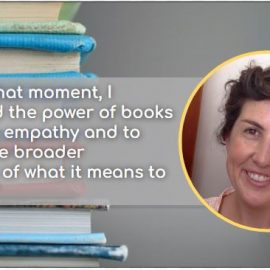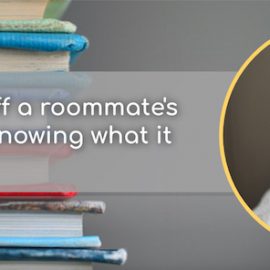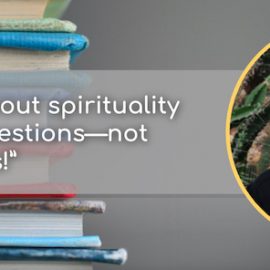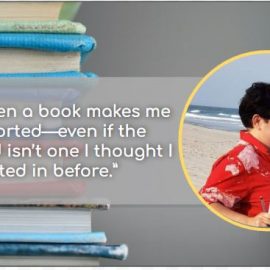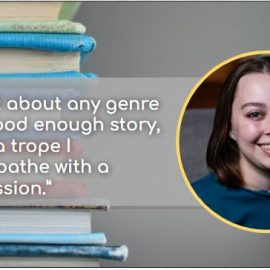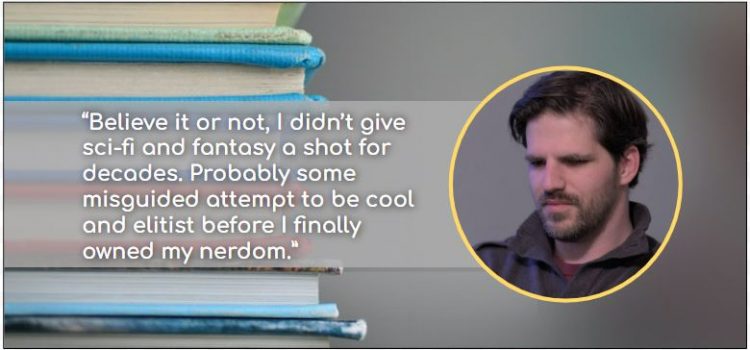
What famous book does Aaron say everyone should read? What book should you go into reading blind?
Located in Michigan, Aaron is a book guide writer and narration reviewer here at Shortform. He didn’t start reading speculative fiction until later in life, and now he’s an enthusiast.
Our Interview With Aaron
We recently interviewed Aaron, and he had a lot to say about his favorite books. Here’s the full interview.
What’s your favorite book?
Ah, the question every book lover dreads! I’d have to say Jonathan Strange & Mr. Norrell by Susanna Clarke. I love everything about it: The world-building—an alternate history set in 19th Century England in which magic is real but has been relegated to abstract academic study. The characters—selfish, petty, curious, and daring. The writing—an excellent imitation of the literary prose of the early 1800s, complete with dry humor, and page after page of footnotes quoting fake academic treatises on magic. And the fairies—terrifying, terrifying fairies. It’s probably not for everyone, but, if you’re down for it, it’s so good.
As for honorable mentions, I’d say Piranesi, also by Clarke. It’s one of those books that’s best if you go in knowing nothing—but I will say that it’s beautiful and deceptively complex. It’s stuck with me since I read it, and I’ve found myself wishing I had the chance to teach or study it in an academic setting.
I also love the first Mistborn trilogy by Brandon Sanderson. It has great world-building, great action, a creative magic system, and lots of really well-earned twists, surprises, and payoffs. It has, by far, the most satisfying ending to a series that I’ve read.
What are you reading these days?
As far as my Shortform reading goes, I most recently finished The Origins of Political Order by Francis Fukuyama and A Guide to the Good Life by William B. Irvine.
As for fiction, I just finished reading the Divine Cities trilogy by Robert Jackson Bennett. I really enjoyed the series—it has action, strong characters, and is heavy on the gods, lore, and postcolonial politics.
If you could have a dinner party with any three authors—dead or alive—who would they be and why?
Silvia Moreno-Garcia, Neal Stephenson, and China Miéville. Judging by their books, all three are smart, articulate, and downright weird—those are all the elements of a good conversation, right?
What’s your favorite genre?
Speculative fiction—in which I’d include fantasy, sci-fi, alt-history, weird fiction, and other stuff along those lines. I love creative world-building, and I love fiction that wraps philosophical questions or odd thought experiments into an immersive story.
Are there any book genres or tropes that you dislike or refuse to read?
As a rule, I’m not a fan of trope-y books of any genre. If I hear a book described as, say, “dark academia with an enemies-to-lovers romance and found family,” I end up picturing some formulaic story-by-number exercise. I prefer when authors don’t rely on tropes or when they at least subvert them.
What’s your favorite way to read a book?
Physical copies for sure! I’m a sucker for a really nice trade paperback with beautiful art and design. Add a picnic blanket under a shady tree in summer or a warm quilt in front of a fireplace in winter, and I’ll be happy.
What book do you think everyone should read in their lifetime?
This is such a cliché, but 1984. George Orwell was such a perceptive observer of politics and human nature that the book still rings frighteningly true today.
Who are your favorite authors? Why?
I have a bunch of favorites, including Susanna Clarke, Ann Leckie, Neal Stephenson, Naomi Novik, Raymond Chandler, and Sir Arthur Conan Doyle. All of my favorite authors bring some combination of interesting ideas, memorable characters, and compelling prose.
How have your reading tastes changed over the years?
Believe it or not, I didn’t give sci-fi and fantasy a shot for decades—I don’t even know why. Probably some misguided attempt to be cool and elitist before I finally owned my nerdom. Same with comics and graphic novels. Unsurprisingly, I’ve read a lot more—and been a lot more passionate about it—since I stopped being such a snob.
Was there a specific book that sparked your love of reading?
There are a number of books that were foundational for me. As a kid, I was really into the Goosebumps series. That led me to a love of horror that’s waned over the years but is still there. In high school, I discovered A Song of Ice and Fire and The Dark Tower series, both of which helped open my mind to fantasy books—though I didn’t fully dive in until later.
In college, I fell hard for Milton’s Paradise Lost and hardboiled detective fiction, both of which, in their own ways, showed me the sheer power of language and style. And, somewhere in there, I got really into H. P. Lovecraft, who, for all of his truly disturbing racism and xenophobia, sparked my love of weird, speculative ideas and fantastical pantheons.
Do you have any guilty pleasure books?
His Majesty’s Dragon by Naomi Novik, and probably the Temeraire series as a whole, but so far I’ve read only this first book. It’s the Napoleonic Wars but with dragons outfitted as manned gunships who make up the military aerial corps. It shouldn’t work, but it really, really does. And, so we’re clear: I don’t feel the slightest bit guilty about this—not even when you consider how much that title sounds like a really bad romance euphemism.
What’s an interesting fact that you learned from a book recently?
According to Francis Fukuyama in The Origins of Political Order, China created the first truly modern state between 770 and 256 B.C. Fukuyama says this was the first time a large area was governed by an organized central power based on professional bureaucracy.
Have any books you’ve read caused you to make any life changes or to change or develop any habits?
I’m generally pretty bad at actually applying any of the self-help stuff I read. That said, Feeling Good by David Burns helped me understand my mind better and gave me useful tools for dealing with some of its worst tendencies.
What’s your favorite quote from a book or an author?
I’m hit or miss on T. S. Eliot, but this passage from “Little Gidding” has stuck with me because of how true it’s felt in my life:
We shall not cease from exploration
And the end of all our exploring
Will be to arrive where we started
And know the place for the first time.
What are your favorite book adaptations?
Oldies but goodies: I like both The Maltese Falcon and Double Indemnity way better in movie form. Both movies are loyal to the books—though Double Indemnity replaces Cain’s ending, wisely, in my opinion—but the performances and the film noir atmospheres add so much life and character compared to what was on the page.
Are there any lesser-known books that you’ve read that you want others to know exist?
I mentioned it before, but Piranesi by Susanna Clarke. It’s a little tough to get into at first, but, if you stick with it, it’s rich, deep, and strangely beautiful.
Also, Spinning Silver by Naomi Novik. It’s a really clever fairytale retelling with great protagonists, nuanced villains, and sharp critiques of the treatment of women and Jewish people in medieval European society.
Lastly, Perdido Street Station by China Miéville. It’s got bizarre world-building, fascinatingly dark and disturbing imagery, and one of the most horrifying monsters I’ve encountered.
At Shortform, how do you go about working on a book that has viewpoints you don’t agree with?
First of all, if I think I truly can’t—or don’t want to—deal with a book fairly, I won’t pick it. That doesn’t mean that I work only on books I agree with, but it does mean that, generally, I see at least some merit in the arguments. When writing guides, I try to make the clearest and strongest case I can for the authors’ claims. If I at least get where the author’s coming from, I can do that whether I agree or not.
I’ve also noticed that I can get bogged down in details, such as my disagreement with the way an author analyzed a text. In those cases, I ask myself whether that material even needs to be in the guide, or if instead I’ve gotten sidetracked by nitpicking. If it does belong in the guide, I take extra care with how I phrase it, and I let my disagreement guide my choice of commentary—though, again, I take extra care not to frame my counterpoints aggressively.
Are there any books you had to read for Shortform that you thought you wouldn’t like and ended up loving?
Not exactly—because we pick our own books. It’s more likely that I’ll pick something that I’m excited about but end up disliking.
Aaron’s Recommended Reading List
- Jonathan Strange & Mr. Norrell by Susanna Clarke
- Piranesi by Susanna Clarke
- The Mistborn series by Brandon Sanderson
- The Divine Cities trilogy by Robert Jackson Bennett
- 1984 by George Orwell
- Paradise Lost by John Milton
- Feeling Good by David Burns
About the Series
At Shortform, we want to give our employees names and faces so you can get to know the people who make the magic happen. That’s why we’re doing the Shortform Reads series, where we interview our employees and share their thoughts and opinions. You can check out more employee interviews here.


